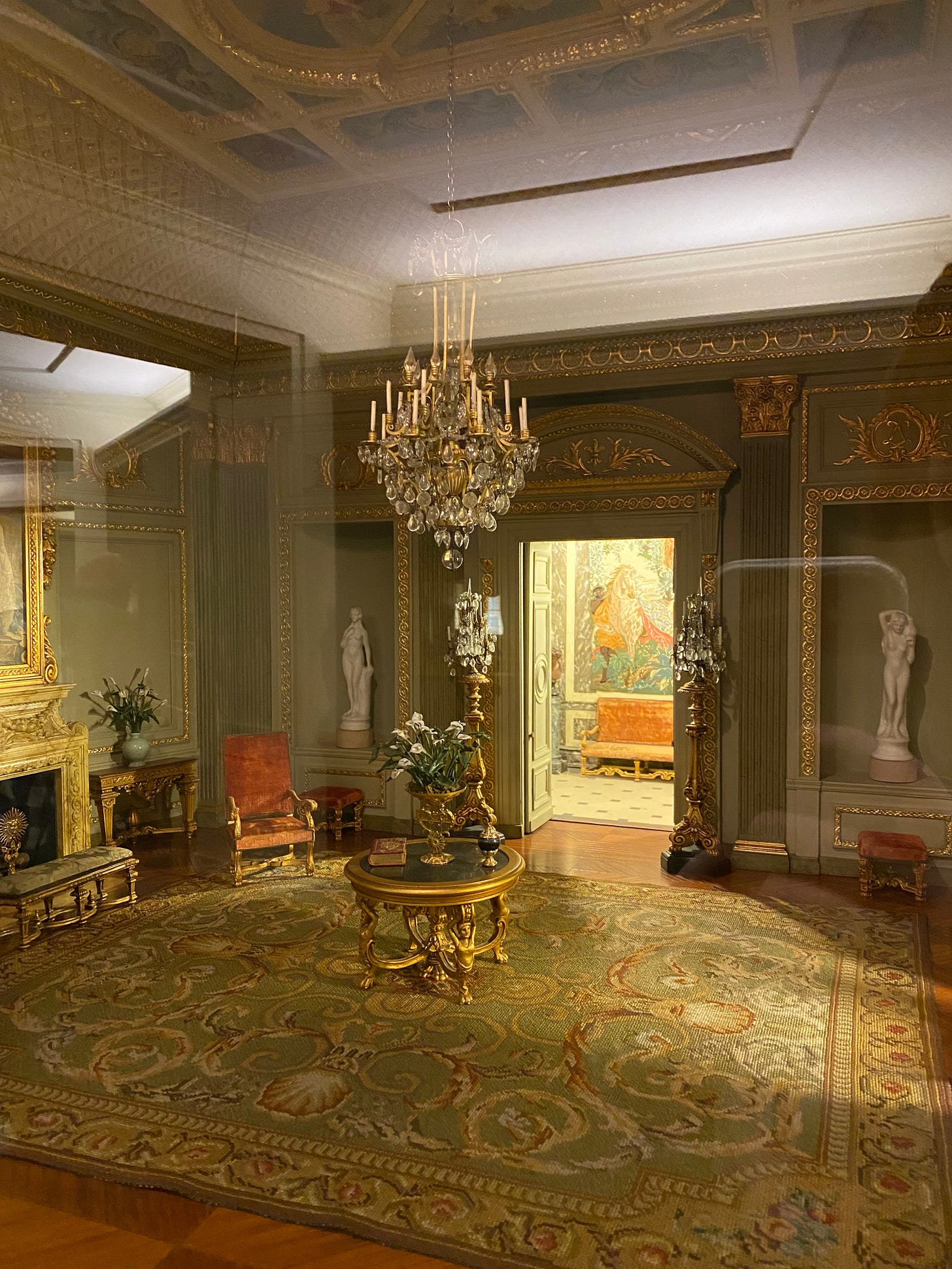*Taken at the Art Institute of Chicago. This room is about a foot tall.
If you ever have the chance to visit a museum with miniature rooms, run, don't walk to that museum! The Art Institute of Chicago has a gallery full of miniature rooms which, if you aren’t familiar, are detailed three-dimensional rooms on a scale of 1:12. These shoe-box style rooms are stunningly detailed to the extent of the appearance of sunlight streaming through miniature gilded living rooms, French foyers, and Gothic chapels. I stood amazed at the care and detail Narcissa Niblack Thorne—the creator and visionary of the miniature rooms in the 30’s—went to in creating these rooms. They were exquisite, though small. I suppose “big” is not always better.
She created something beautiful that mirrored the real thing. Why take care to perfectly depict the way sunlight streams in a country house on a sunny afternoon? Why recreate the intricate details of ordinary objects on coffee tables that are partially hidden from sight in the glass casing of the miniature room? One answer is because that’s what miniature artists do. The details make the room so exquisite.
As I observed these rooms, I was reminded of C.S. Lewis’s Meditation in a Toolshed where he discusses “looking along” versus “looking at.” The miniature rooms offer a perfect example of this. As an observer of these tiny rooms, I was “looking at” the rooms objectively. However, if I were to visit a country house in France or a Gothic cathedral in-person, I would be “looking along” because I am inside that which was depicted in the miniature rooms. One is a detached observation and one allows the individual to smell the incense, feel the sunlight, and sit on the velvet chair instead of imagining or reading about what it must be like. Likewise, our lives are sort of a miniature room within a miniature room. We obviously “look along” in our daily lives, but we cannot fully “look along” things with eternal significance on this side of heaven. We are in the smallest of miniature rooms looking at another room from inside. We “look along” while “looking at” in the hopes of one day looking along the room we now look at. Clear as mud?
As I stood there looking into these mini versions of rooms that I will probably never visit, a common childhood question popped into my head. Is this how God sees the world? Us? Me? As a child, I wondered how God could really care about my life if God was so big and I was so small. As I grew, this query matured into trying to reconcile the small and finite nature of human life with my desire for my life to mean something and not be “chaff that the wind blows away.” Recently, I watched the film version of Carolyn Weber’s, Surprised by Oxford, and recall one of her professors saying something to this effect:
Anything done without eternal significance is ultimately doomed to futility.
As I stood in the room of miniature rooms, I saw exquisite artwork full of detail and beauty that reflected the real thing. That is us, I thought. Full of eternal significance and reflecting all that is real and true—the Creator, the real thing. The smallness of something does not diminish its value, though it usually tells us there is something else in store. Infants grow to be adults, seeds turn into ripe vegetables, frail people receive glorified bodies. Remember the Savior of the world came in a very small package, but as Lewis writes, “once in our world a stable held something in it that was bigger than our whole world.” The Incarnation tells us that God “looked along” our world and saved it.
Being an observer of miniature rooms offers a valuable perspective on life and meaning. We are the miniatures that reflect the real thing—full of detail, care, and the imprint of the Artist. Discovering what is real and what is not is the task set before us, as Weber’s professor tells her in their conversation. What lasts forever and what does not? Grass withers. Flowers fade. But our lives are not haphazardly thrown together by God. Like the miniature rooms, they were created with stunning detail and filled with significance. Our lives, though small and short, are significant because of Who they reflect. This truth is why we love our neighbor, fight for justice, and pursue that which holds eternal significance.
Have you visited miniature rooms before? Did you come away with any insights or new perspectives? Any nuance you would add to this post?




